Experienced authors tend to chastise vanity press victims for not doing sufficient research, but the murky web of vanity partnerships — and the uncritical coverage which invariably accompanies same — makes it difficult for newer writers to chart a safe path.
Some vanity presses are very good at crafting a veneer of legitimacy, one which can be very convincing to those starting out. Infamous vanity press conglomerate Author Solutions figured this out very early on, creating partnerships with Penguin, Harlequin, Writer’s Digest, Random House, HarperCollins/Thomas Nelson, Hay House, Reader’s Digest, Lulu, and Barnes & Noble. (And the Author’s Guild as well, although they would very much like you to forget that.)
These partnerships served two purposes. First, they delivered an endless stream of victims directly from the companies themselves who would refer business to Author Solutions in return for a cut. Second, they helped Author Solutions whitewash its past, acting as a reputational fig leaf, hiding its seamy nature until it was too late.
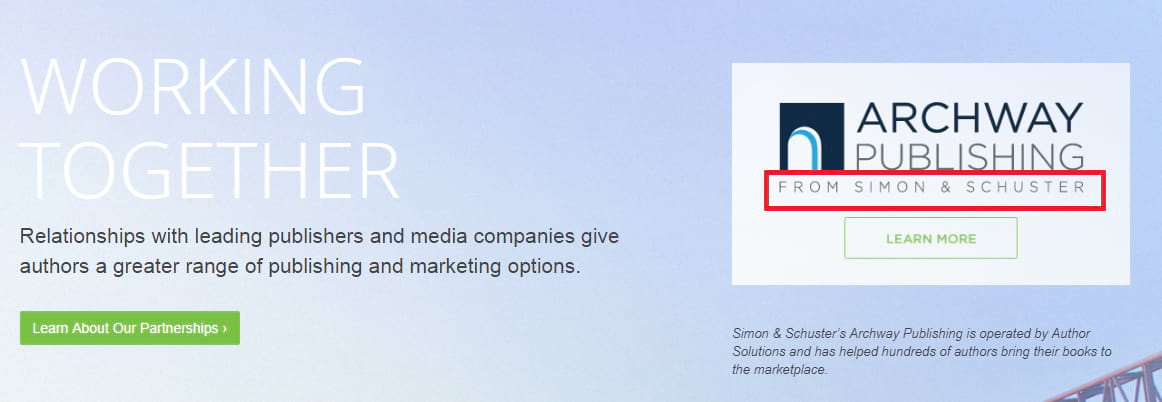
It wasn’t just publishing partnerships that Author Solutions engaged in, but marketing and media partnerships too. Author Solutions sells a range of products to its customers (like all vanity presses, revenue predominantly comes from selling things to writers, rather than selling books on behalf of writers). These include themed marketing packages which promise to get you exposure in the New York Times, or reviews from industry magazines like Kirkus, or appearances at literary events — in all cases charged at staggering prices.
The media partnerships were especially insidious as they seem to have muzzled a lot of criticism — Publishers Weekly immediately comes to mind — but it turns out that not all companies which Author Solutions used in this manner were willing participants in that embrace.
I spoke with the New York Review of Books about the long-standing practice of Author Solutions re-selling ad space in its magazine. The New York Review of Books was unequivocal: it has no partnership whatsoever with Author Solutions. In fact, Author Solutions is not permitted to resell its ad space, and has been warned a number of times to discontinue the practice.
Despite this, Author Solutions continued to sell a New York Review of Books-themed marketing package across its various vanity imprints such as Xlibris, Trafford, AuthorHouse, Balboa Press, Archway, LifeRich, Palibrio, and iUniverse for some time. Indeed, at the time of writing, Author Solutions is still selling a New York Review of Books marketing pack at Archway Publishing — the vanity press it runs on behalf of Simon & Schuster.
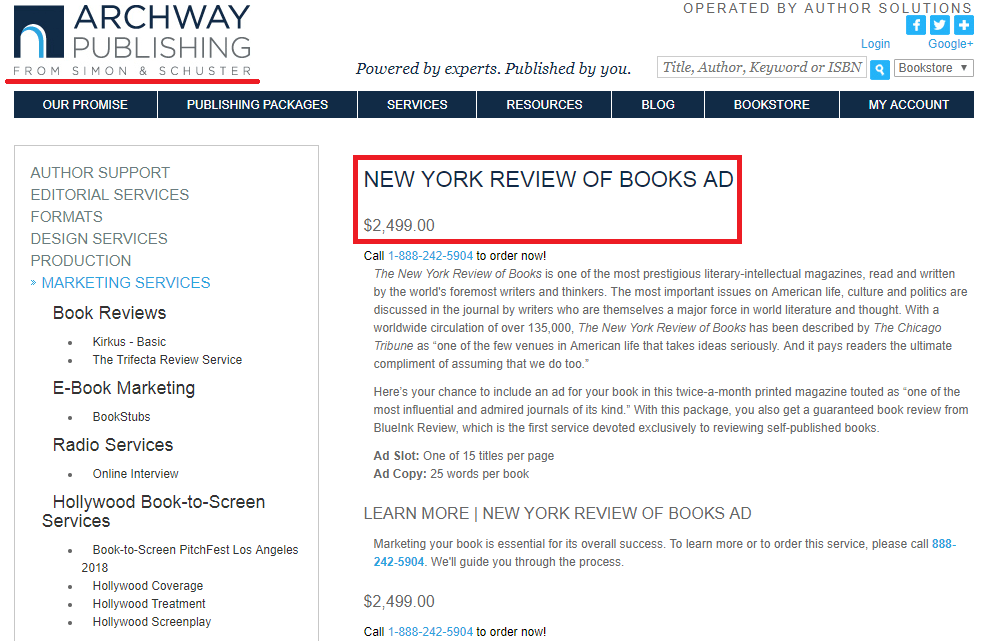
The ad space that Archway is selling to its customers for $2,499 is being sold at a significant mark-up. Archway squeezes in fifteen books in this advertisement too, bringing in a serious sum. This mark-up looks especially bad when compared with the prices charged if you go direct to the New York Times Review of Books yourself, where you can buy a slot for $300, and you will only have to share the page with 8 other titles.
Author Solutions is also still selling a New York Review of Books package via its subsdiary Xlibris, this time for an astonishing $4,899 (although it’s unclear how many books they shoehorn into that particular ad).
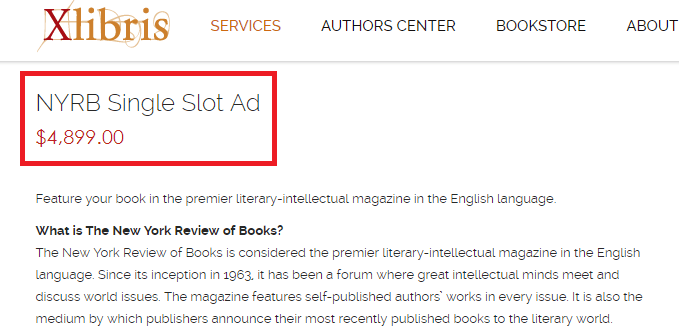
The New York Review of Books had very strong words for this practice, explaining how upsetting it was that Author Solutions persisted in this manner, particularly that Author Solutions makes it sound like they have some kind of partnership with them, or that the New York Review of Books is aware of, or endorses, the practice of marking-up and reselling.
I would really appreciate it if you’d make your readers aware that if they’re being charged more than a few hundred dollars to advertise a book with New York Review of Books, they’re being scammed.
Of course, the greatest trick that Author Solutions ever pulled was getting itself purchased by Penguin in 2012 — a move which gave it instant credibility, but also generated a huge outcry among writers, particularly after a couple of class actions revealed the grim nature of its business practices in forensic detail.
However, Penguin Random House now seems to have quietly severed all links with Author Solutions. After selling the company for what is widely assumed to be a huge markdown in 2016, it still maintained various partnerships with the company. The white label vanity press Author Solutions ran for it in Africa, India, and Singapore – Partridge – now seems to have removed all the previous Penguin branding and links it had been adorned with. and it appears to be run as a standard Author Solutions imprint.
The case of Random House’s Spanish self-publishing platform MeGustaEscribir is a little different. It also seems to have dispensed with Author Solutions’ services but have held onto the platform itself, hiring another white label publishing service called Lantia to run it on their behalf instead. Although, it was amusing to note the familiar, overblown promises about being promoted by the biggest publisher in the world and joining the ranks of esteemed authors like Ken Follett and Isabel Allende, contrasting with the reality hidden in the legal small print, which clearly states that Penguin Random House would have nothing to do with the book. Some things never change.
The number of publishing partners for Author Solutions has dwindled considerably. Crossbooks, Barnes & Noble, Harlequin, and Writer’s Digest all terminated their various partnerships in the last few years, joining the likes of Bowker and The Bookseller who ended advertising/marketing relationships in 2013/14.
Some Author Solutions partnerships have proved surprisingly enduring, however. Westbow Press – the Christian-flavored vanity press infamously set up by Michael Hyatt – continues to be run by Author Solutions on behalf of Thomas Nelson/Harper Collins. And Archway, of course, is still being quietly operated by Author Solutions on behalf of Simon & Schuster, shamelessly playing up its supposed links to the New York publisher, even though the role that Simon & Schuster plays is strictly limited to delivering victims and collecting the money.
As for marketing and media partnerships, Author Solutions still re-sells products like Kirkus reviews, Guardian Weekly ad spots, and space in the New York Times Sunday Book Review, usually at exorbitant mark-ups. Whether those organizations are aware of this re-selling and price gouging is unclear as they refuse to discuss the matter. Although I should note that when the New York Times does cover Author Solutions, the coverage is unfailingly positive, despite incessant complaints from writers about those business practices. For example, the New York Times didn’t cover the class actions at all.
The case is a little clearer with literary events such as Word on Street Toronto and the Miami Book Fair. Author Solutions sells book signing packages to its customers for thousands of dollars. The organizers of these events are aware of this but have refused to put a stop to it – no doubt influenced by the large rows of booths that Author Solutions purchases at their events each year.
Another company that plays a central role in Author Solutions marketing packages is Publishers Weekly – the supposedly respectable trade industry magazine. Author Solutions sells Publishers Weekly-themed marketing packages for up to $11,999.
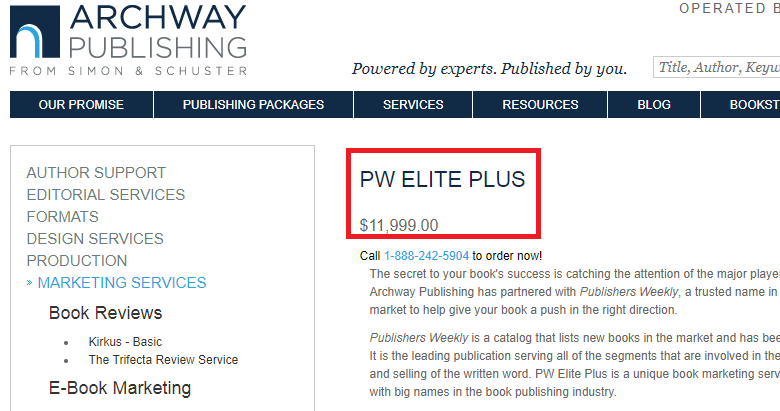
Not only does Publishers Weekly refuse to stamp out this exploitative practice, it has also allowed it to spread to other vanity presses such as Readers Magnet — a real shady enterprise that is said to be set up by former Author Solutions staff, which is now selling Publishers Weekly packages for an astonishing $13,999.
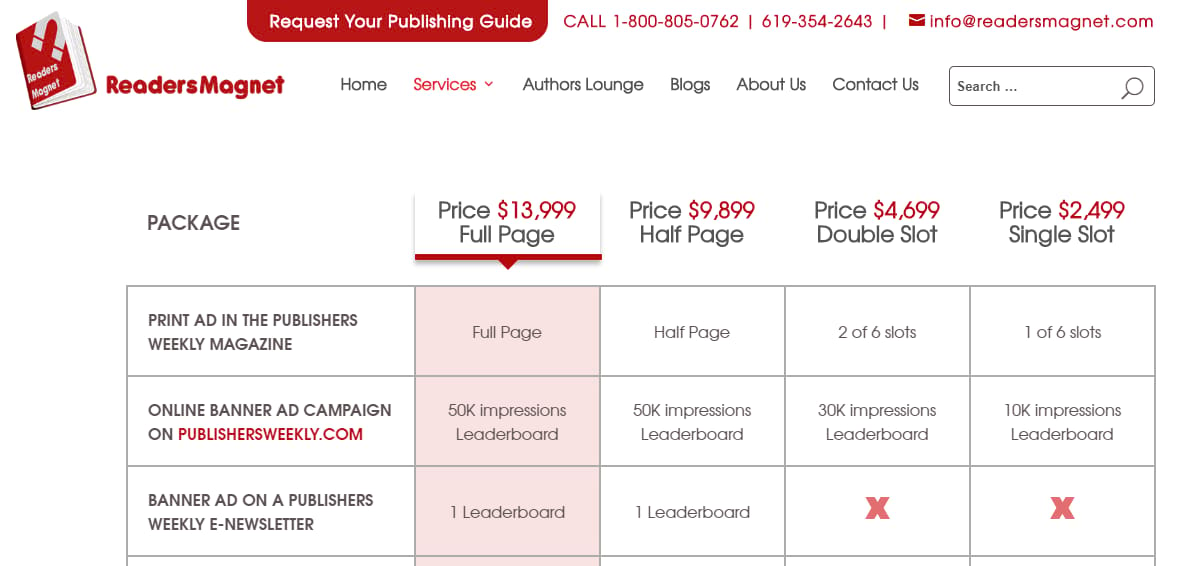
Publishers Weekly is particularly bad on this front. While it is fond of engaging in flag-waving about its own pet issues such as Amazon’s dominance, its conscience goes very quiet indeed when it comes to accepting ad money from companies with questionable business practices. The walls between advertising and editorial are so non-existent that you will only ever see positive coverage of companies like Author Solutions, Morgan James, or Austin Macauley.
Indeed, here is Writer Beware criticizing Publishers Weekly for just that — giving glowing, uncritical coverage to companies “whose business model is largely built on author fees.”
This practice is spreading too. Porter Anderson is the editor-in-chief of Publishing Perspectives. He wrote a puff piece on Austin Macauley last week, which immediately attracted strong criticism from Writer Beware in a comment underneath. One week later, Porter Anderson has refused to explain why he is promoting this company, despite Victoria Strauss pointing him to this blog post about Austin Macauley and the 100+ comments it generated underneath.
In this particular case, I think Porter Anderson’s client is Sharjah Publishing City rather than Austin Macauley (he didn’t respond to inquiries). Either way, this is another example of the influence-peddling circle jerk that is plaguing the industry. One which makes it incredibly difficult for new writers to sort the good from the bad. Especially when companies further spin that glowing coverage in their own marketing.
While I strongly urge all authors to conduct appropriate due diligence before signing any contract or handing over any money or entering into any business relationship, the preponderance of these partnerships — and the uncritical coverage which invariably accompanies them — muddies the water considerably.
Newer writers especially tend to be the most vulnerable, unaware of the many nuances in publishing. So the next time you hear someone blaming a vanity press victim for not doing their research, perhaps you should point to the famous names doing all this pimping.


Mr. Gaughran,
Thanks so much for writing and sharing this article. I am one of those people that opted to go with Xlibris to get my first two books out into the world. I’ve eschewed their repeated attempts to up-sell me for things like marketing, etc. Up until very recently, I had no idea that things like CreateSpace even existed. It’s as I have networked in the author community more and more that some very disturbing data, like what you’ve shared here, about Xlibris and other ‘vanity press’ entities has come to my attention.
At the time I started with them, the package was $750 per book. This did include things that I really didn’t want to have to do myself – like copyright registration.
But if I had known then what I am learning and hearing about now. Oh sweet Lord. So many things I’d have done differently.
So, before another book of mine is finished, I am learning all I can about going the DIY route. Xlibris won’t get another dime from me. I count myself very lucky that they ONLY got $1500 total from me.
Just yesterday I attended a local author-sales event in my home region of West Michigan. I co-lead a very small regionally focused traditional press. Four authors approached me to discuss their work. Of the four, one complained that Westbow wanted $800 more to “do marketing” for him now that he has physical copies of his book — he’s a retired pastor with limited income and no understanding of even basic concepts of publishing. All he knew was that he was told he needed to sell 350 copies of his book to break even (whatever that means!) and told me he didn’t understand why or how, and that he felt like the Fuller Brush Man selling one book at a time. Two others asked me how much it’d cost for us to publish them, and when I delivered my mini-spiel about traditional/vanity/self publishing, both were shocked to learn that paying to be published isn’t a normal/legit thing.
Not much we can do about late-career/hobbyist writers, but the MFA grads ought to be better prepared. They aren’t. Not a single writing program in any college/university in West Michigan offers a course about publishing or the business of writing.
Even the folks who ought to know better, including a lot of the high-profile by-author/for-author blogs and authors of how-to-get-published books, follow the Underpants Gnome theory of publishing: Write book, ???, PROFIT. With relatively few exceptions (Jane Friedman comes to mind), most of these sites and books focus on writing a first novel and shopping it, without offering much by way of content expertise about the legal and financial stakeholder relationships among the various publishing models. It’s not a surprise that authors who *think* they’ve done basic due diligence are nevertheless led astray.
So in light of David’s opening sentence, I think I’m finding it harder to fault writers who *do* attempt some degree of market/industry research, but who are scandalously underserved by the most popular how-to-be-a-writer books and websites on today’s market.
It’s awful that these predatory vanity presses exist — but until agents, publishers and academics address this significant failure of pedagogy, I think we’re contributing to a climate where well-intentioned first-time writers find it easy to be suckered into these pay-to-publish scams.
The Twitter link does not work to post it on Twitter. Had to do it manually
Might have just been a temp glitch – haven’t seen any issues at my end – but let me know if it recurs.
Thank you for such an informative article. It was a shock to read a lot of it. I was one of the “victims” of an industry given to scamming hopeful writers.
I paid five figures to Westbow Press for my first book, a non-fiction account of my marriage to my late wife of 28 years. That was in 2009. How naive I was. My “royalty” for a $28 book was $2.00 and then I met people who bought it from them, but Westbow aka Author Solutions didn’t pay me a dime. I had words with their reps at various levels but to no avail. All I got were denials of wrongdoing. Since then I have been writing an historical fiction series through Createspace and KDP. Working with them has been easy and pleasant. I would still like to get published or an agent at least once to see if I like it better.
i’ve kept track of your sound advice for a long time, David.
What I don’t understand is this notion that you, the author, should have to pay a red cent to get a book published. There are plenty of publishing houses available and it helps to have an agent working for you if you want to go the standard route.
In fact, you do approach a standard publishing house without representation, you are setting yourself up for nothing but an expensive ripoff. The word ‘scam’ is in adequate. It is theft, nothing else.
The alternative, of course, is Amazon’s Create Space/Kindle platform, if you can do your own advertising and know how to reach your audience. There are other, similar platforms that do not charge a cent for anything, until you make a sale.
Right now, I can think of only three people who self-published successfully. Gwen Frostic was one: no one would take her poetry, so she found a printer, did all the work including the prepress production, did the advertising, and made publishers wish they had not been so stubborn. Another was Rod McKuen, who saccharine poems hit the spot with a lot of women: no one would take his poetry, and like Frostic, he self-published and did quite well. The third one was a man who wrote a book on how to build canoes. No one would take the manuscript and illustrations, so he went to Carlton Press – I think that was the name. It was the only self-publishing that advertised constantly, but this individual sent fliers out through the mail to everyone he could find in phone books at the library, and had several press runs on that book.
The thing is that all three of these people worked at it.
That is something not understood by current self-publishers who cough up stupendously stupid cash sums to get something published. If they haven’t tried going through an agency, or have only one book and nothing else planned, they aren’t serious about being authors.
I hope you will continue to pound on this subject and keep the info as up to date a possible, so that people will stop falling for this obnoxious con game . Maybe someone should sue Author Solutions into ground for fraud, but the “fraud” portion would be hard to prove unless they made promises they didn’t keep. Extortion? Maybe. I’ve been to Sci-fi cons that didn’t charge nearly as much as AS charges, gave participants a chance to hawk their wares and autographing tables and the charges were modest at their highest levels. If there IS any way to bring AS to its knees, it will be through exposing their extortionate prices and the con job they foist on people.
Please continue, David. I know I don’t post comments here very often, but I do keep a weather eye on things.
“Although I should note that when the New York Times does cover Author Solutions, the coverage is unfailingly positive, despite incessant complaints from writers about those business practices. For example, the New York Times didn’t cover the class actions at all.”
I keep seeing tweets from the Times focusing on the word Truth. How to reconcile this with your post?
Perhaps there are different flavors of Truth, like an ice cream shop. We like vanilla, the Times likes rocky road.
Or maybe they have a Truth quota? They are a large media conglomerate…excuse me, newspaper…after all, and us peons surely don’t understand how a convoluted entity like that works.
Does anyone have an answer to this mystery wrapped inside a conundrum tucked inside a quandary?
I don’t think there is a news organization in the world without its shibboleths and blindspots. I would hope the NYT will address this particular case as it gives off an impression I’m sure they wish to avoid: that the walls between advertising and editorial are a bit more porous than they should be.
Excellent post David. Thanks for doing all that meticulous research. After over five years as an Indie, I’m still shocked by how unscupulous these companies are, and I’m not talking about Author Solutions. A.S. are just conmen and sharks. No, the ones that shock me are the multi-billion dollar companies that still feel the need to rip off unsuspecting Indies.
Is it truly the money they’re after? Or do they see their support of A.S. as some kind of guerilla war against the upstarts invading their territory? A kind of ‘serves Indies right’ attitude?
Whatever it is, I don’t like it one little bit. 🙁
Here’s my fact: Aspiring authors or those who have the deep pockets to pay for scam-type publishing are way above my pay grade. Plus they have stars in their eyes. There is not a fact one could share with them that would bring them down to earth. I’ve tried on numerous occasions and gave up in frustration. Too, those authors engaging the scam site publishing arenas often only have one book, with no intention to publish another. I no longer make suggestions because they’re happy until they wise up–which may be NEVER.
I don’t even try, Jackie. I know a couple of writers who’ve gone through vanity presses and are thrilled with their “publishers”. Isn’t that the point of a vanity press–to make writers feel like they have a real publisher? And they do the job so well, with a constant stream of flattery and validation, that their victims float around on cloud nine and look down on us DIY self-publishers as lesser beings.
I just smile and nod and then go back to my lucrative DIY business. Honestly, after six years of self-publishing I’m tired of defending myself against people’s assumptions. I try to point new writers in the right direction and away from the sharks, but the notion that you’re only any good if you have an agent and a large publishing company dipping into your earnings is so ingrained that it’s like fighting the incoming tide. As David shows, that’s because of the intricate web of personal relationships and influence that constitutes the real power of traditional publishing. They have 200 years of knowledge about how to put the best spin on any situation, and that includes creating a web of disinformation and derision about self-publishing that makes it look like second best. Even to many self-publishers, who jump at the first contract they’re offered by a “real” publishing house.
I agree. I published my first mystery book this month. I did it myself. I have a background in computer science, graphic arts, and publishing. So it helped but I still had to have a good story. I’ll admit I’m a newbie writer (wrote millions of academic and technical words) but I worked in book and newspaper, advertising and sales, you are better off contacting the actual newspaper and asking what their rates are for ads. Don’t sign a contract. You might have to pay a little more but don’t lock yourself into any contract unless you read it thoroughly. This is an unbelievable scam. I was once contacted by Xlibris. I recognize a scamming sales pitch when I hear it.
Companies like that give sales and marketing a bad name. You are better off doing your own research. The SBA (I taught small business classes) offers many great classes for beginning businesses. As an indie author that’s what you are in business. Your product is your book. I did tons of research before I decided to go with Create Space, Kindle, and D2D. Everything was upfront. Create Space was fairly easy as was Kindle. Weird how Amazon keeps the two separated. D2D is so very prompt about answering any questions. They were a joy to work with on my e-book. Hope they have print soon. I believe in straightforward upfront advertising and marketing, no scamming or trying to game the system. The long tail growth is what I’m after. Love your blog and your writing books. Very helpful.
Locally, I have many author friends who have published with Author Solutions in one of it’s forms. I’ve learned to simply leave the subject alone. They think they have a Real Publisher and so have that validation that so many unsuspecting authors want.
I’ll give them the websites for D2D, Create Space and KDP and let them know they don’t have to pay so much to get so little in return. Some of them I will redirect to Indie websites, like yours.
It takes time for newbie authors to ‘learn the ropes’ of DIY publishing, so all I can do is give them a little bit of information at a time.
I was one of those authors. This was back in 2002-2007. Thank God the prices weren’t that steep back then, though I did rack of $10,000 when all was said and done. I am eternally grateful to the authors who pointed me to CreateSpace, KDP, and Smashwords. Hopefully, the authors you’re talking to will listen. You’re doing a wonderful thing by warning them.
Funny you post this. Just yesterday I was contacted by LitFire by phone and alarm bells went off immediately. While I had him on the phone, I was googling them. We never got far enough in the conversation for him to tell me how much their stellar marketing plans cost because I demanded to know how he got my phone number. He claims family or friends gave it to him. I can only conclude that he got it from a workshop I did about a month ago. I stupidly gave that outfit all my info including my number and they clearly sold my info. That’s the last time I fall for that.
Here is Writer Beware on Litfire, another very questionable company said to be founded by former Author Solutions staff: https://accrispin.blogspot.com/2014/11/solicitation-alert-litfire-publishing.html